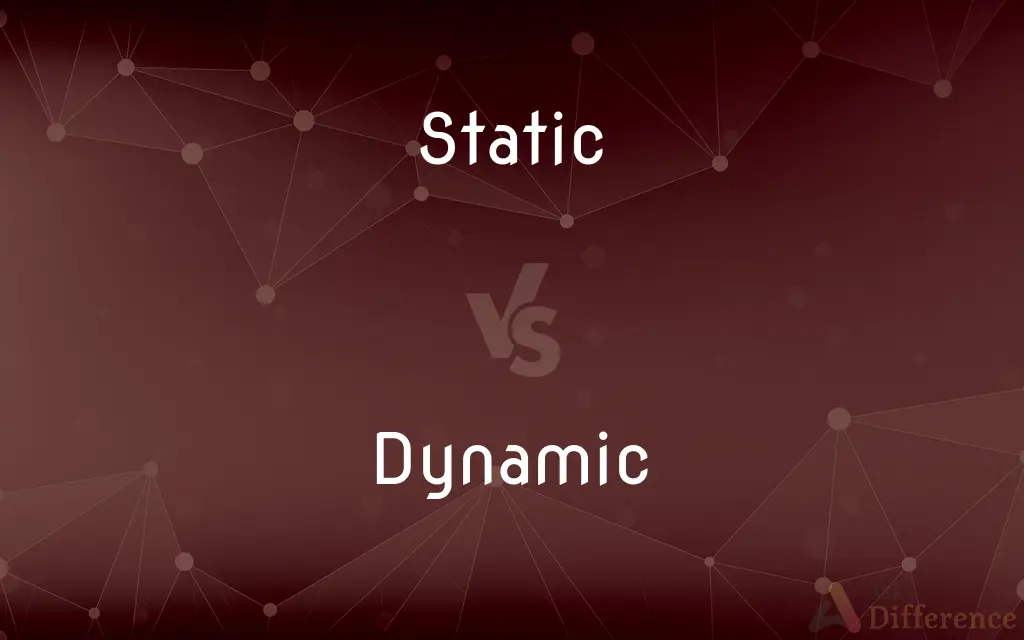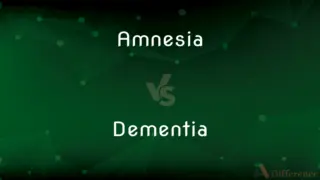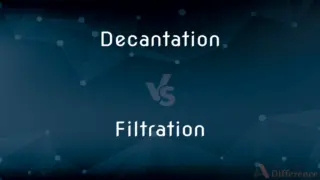Static vs. Dynamic — What's the Difference?
By Tayyaba Rehman — Updated on January 16, 2024
"Static" refers to something fixed and unchanging, while "Dynamic" denotes constant change, movement, or progress.

Difference Between Static and Dynamic
Table of Contents
ADVERTISEMENT
Key Differences
Static and dynamic are terms often used to describe contrasting states or conditions. Static implies a lack of movement, change, or development. It is associated with things that are constant, unvarying, or at rest. Dynamic, in contrast, signifies movement, change, and progression. It's linked to things that are constantly evolving or active.
In the context of physics, static refers to forces or objects at rest or in equilibrium, with no net force acting upon them. Dynamic relates to forces causing movement or change in objects. For instance, static friction prevents an object from moving, while dynamic friction occurs when an object is moving.
In technology, particularly in web development, a static website is one where the content does not change unless manually updated by the developer. A dynamic website, however, has content that can change based on user interactions, time, or other factors.
In terms of personality or group dynamics, a static character or group remains the same throughout, without significant development or change. A dynamic character or group, however, undergoes significant growth or transformation.
The choice between static and dynamic approaches depends on the context and desired outcome. Static methods might be preferred for stability and consistency, while dynamic methods are chosen for flexibility and adaptability.
ADVERTISEMENT
Comparison Chart
Definition
Unchanging, at rest
Changing, moving, evolving
Example in Physics
Static friction, equilibrium
Dynamic friction, movement
Technology Example
Static website (fixed content)
Dynamic website (content changes)
Characteristic in People
Unchanging personality or behavior
Evolving or changing personality or behavior
Application
Preferred for stability and consistency
Chosen for flexibility and adaptability
Compare with Definitions
Static
Unchanging or at rest.
The sculpture remained static in the museum.
Dynamic
Characterized by constant change or activity.
The dynamic market requires constant analysis.
Static
Pertaining to forces in equilibrium.
Static tension in the cable keeps the bridge stable.
Dynamic
Involving active processes or movement.
Dynamic exercises are a part of our training routine.
Static
Having no motion; being at rest; quiescent.
Dynamic
Energetic or forceful.
Her dynamic presentation captivated the audience.
Static
Fixed; stationary.
Dynamic
Capable of changing or being changed.
The software has a dynamic interface that adapts to user inputs.
Static
Not subject to change.
The static rules of the game made it predictable.
Dynamic
Of or relating to energy or to objects in motion.
Static
Lacking movement or development.
The economy has been static for several months.
Dynamic
Relating to web content that updates automatically.
The website's dynamic content keeps visitors engaged.
Static
Referring to unchanging web content.
Our company's static website needs an update.
Dynamic
Of or relating to the study of dynamics.
Static
(Physics) Of or relating to bodies at rest or forces that balance each other.
Dynamic
Characterized by continuous change, activity, or progress
A dynamic housing market.
Static
(Electricity) Of, relating to, or producing stationary charges; electrostatic.
Dynamic
Characterized by much activity and vigor, especially in bringing about change; energetic and forceful.
Static
Interference or noise, such as crackling in a receiver, produced when static or atmospheric electricity disturbs signal reception.
Dynamic
Of or relating to variation of intensity, as in musical sound.
Static
Back talk.
Dynamic
A force, especially political, social, or psychological
The main dynamic behind the revolution.
Static
Interference; obstruction.
Dynamic
Changing; active; in motion.
The environment is dynamic, changing with the years and the seasons.
Dynamic economy
Static
Angry or heated criticism.
Dynamic
Powerful; energetic.
He was a dynamic and engaging speaker.
Static
; that cannot or does not change.
Dynamic
Able to change and adapt.
Static
Making no progress; stalled, without movement or advancement.
Dynamic
(music) Having to do with the volume of sound.
The dynamic marking in bar 40 is forte.
Static
; fixed in place; having no motion.
Dynamic
(computing) Happening at runtime instead of being predetermined at compile time.
Dynamic allocation
Dynamic IP addresses
The dynamic resizing of an array
Static
(programming) computed, created, or allocated before the program starts running, as opposed to at runtime.
Dynamic
Pertaining to dynamics, the branch of mechanics concerned with the effects of forces on the motion of objects.
Static
(object-oriented programming) defined for the class itself, as opposed to instances of it; thus shared between all instances and accessible even without an instance.
Dynamic
(grammar) Of a verb: not stative, but fientive; indicating continued or progressive action on the part of the subject.
Static
(uncountable) Interference on a broadcast signal caused by atmospheric disturbances; heard as crackles on radio, or seen as random specks on television.
Dynamic
A characteristic or manner of an interaction; a behavior.
Watch the dynamic between the husband and wife when they disagree.
Static
Interference or obstruction from people.
Dynamic
(physics) A moving force.
The study of fluid dynamics quantifies turbulent and laminar flows.
Static
(uncountable) Static electricity.
Dynamic
(music) The varying loudness or volume of a song or the markings that indicate the loudness.
If you pay attention to the dynamics as you play, it's a very moving piece.
Static
(countable) A static caravan.
Dynamic
(music) A symbol in a musical score that indicates the desired level of volume.
Static
Verbal abuse.
Dynamic
(grammar) A verb that indicates continued or progressive action on the part of the subject.
Static
A static variable.
Dynamic
Of or pertaining to dynamics; belonging to energy or power; characterized by energy or production of force.
Science, as well as history, has its past to show, - a past indeed, much larger; but its immensity is dynamic, not divine.
The vowel is produced by phonetic, not by dynamic, causes.
Static
Resting; acting by mere weight without motion; as, statical pressure; static objects.
Dynamic
Relating to physical forces, effects, or laws; as, dynamical geology.
As natural science has become more dynamic, so has history.
Static
Pertaining to bodies at rest or in equilibrium.
Dynamic
An efficient incentive;
They hoped it would act as a spiritual dynamic on all churches
Static
A crackling or hissing noise cause by electrical interference
Dynamic
Characterized by action or forcefulness or force of personality;
A dynamic market
A dynamic speaker
The dynamic president of the firm
Static
Angry criticism;
They will probably give you a lot of static about your editorial
Dynamic
Of or relating to dynamics
Static
Not active or moving;
A static village community and a completely undynamic type of agriculture
Static feudal societies
Dynamic
Expressing action rather than a state of being; used of verbs (e.g. `to run') and participial adjectives (e.g. `running' in `running water')
Static
Not in physical motion;
The inertia of an object at rest
Static
Concerned with or producing or caused by static electricity;
An electrostatic generator produces high-voltage static electricity
Static
Showing little if any change;
A static population
Common Curiosities
Are dynamic systems more complex than static ones?
Generally, dynamic systems are more complex due to their changing nature.
What is a static character in literature?
A static character is one who does not undergo significant change throughout a story.
Can a website be both static and dynamic?
Yes, a website can have static pages as well as dynamic elements that change.
What's an example of a dynamic process in nature?
An example of a dynamic process in nature is the water cycle, which is continuously changing and moving.
What makes a dynamic personality?
A dynamic personality is one that is energetic, adaptable, and often undergoes changes.
Is static electricity the same as a static object?
Static electricity refers to a stationary electrical charge, while a static object is one that is not moving.
Can a dynamic environment be controlled?
While dynamic environments are subject to change, certain aspects can be controlled or predicted to some extent.
Why is dynamic stretching recommended before exercise?
Dynamic stretching involves movement and is recommended to prepare muscles and joints for the range of motion required in exercise.
Is static friction stronger than dynamic friction?
Often, static friction is stronger than dynamic friction, making it harder to start moving an object than to keep it moving.
What are static methods in programming?
Static methods in programming are those that belong to the class, not a specific instance, and can be called without creating an instance of the class.
Can a dynamic character become static in a story?
Yes, a dynamic character can become static if they stop undergoing significant changes as the story progresses.
Are dynamic websites better than static ones?
Dynamic websites offer more functionality and are better for complex tasks, but static websites are faster and more secure for simpler content delivery.
What is a static variable?
A static variable in programming retains its value between function calls and is associated with the class, not instances of it.
Is a static IP address always the same?
Yes, a static IP address remains the same over time, unlike a dynamic IP address which can change.
Share Your Discovery

Previous Comparison
Amnesia vs. Dementia
Next Comparison
Decantation vs. FiltrationAuthor Spotlight
Written by
Tayyaba RehmanTayyaba Rehman is a distinguished writer, currently serving as a primary contributor to askdifference.com. As a researcher in semantics and etymology, Tayyaba's passion for the complexity of languages and their distinctions has found a perfect home on the platform. Tayyaba delves into the intricacies of language, distinguishing between commonly confused words and phrases, thereby providing clarity for readers worldwide.














































